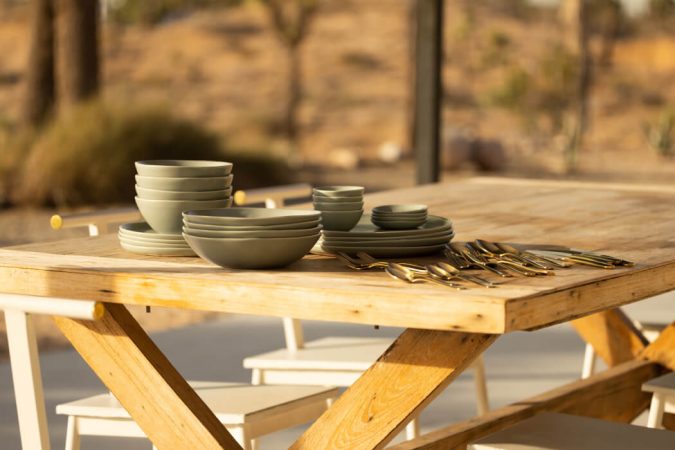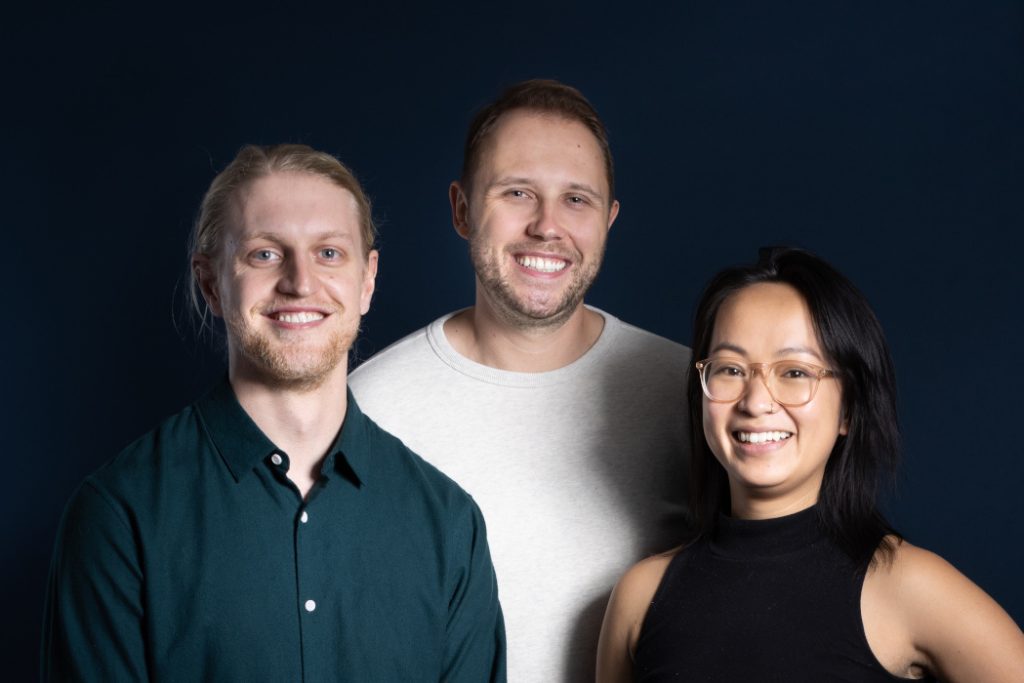
Direct-to-consumer (D2C) tableware startup Fable has secured $8.4 million CAD ($6.55 million USD) in Series A financing to move beyond the dinner table.
Vancouver-based, sustainability-focused Fable—not to be confused with the Toronto-based accessibility tech startup of the same name—currently sells premium dinnerware products to North American consumers, from plates and bowls to utensils and textiles.
Fable’s vision is to build a D2C brand that serves North America and Europe “across all areas of the home.”
With its Series A funding, Fable plans to expand into the United Kingdom (UK), open new retail locations, and offer a wider selection of home goods products.
“All the little items that sit around your home, that make a house a home—we want to make those pieces,” Fable co-founder and CEO Joe Parenteau told BetaKit in an interview.
Fable’s vision is to build a D2C brand that serves North America and Europe “across all areas of the home.” Parenteau says the startup plans to stick to the home décor space for the time being, adding that Fable has no immediate plans to dive into furniture, which is typically more expensive to build and ship than smaller goods.
Fable’s all-equity Series A financing, which closed in June, was led by Chicago-based Listen Ventures with support from existing investors, UK’s True and Halifax-based Sandpiper Ventures. The round, which comes just under a year after Fable closed $3.4 million CAD in seed capital led by True, brings Fable’s total funding to around $13 million CAD.
Founded in 2019 by Parenteau, Fable head of operations Max Tims, and head of technology Tina Luu, Fable’s products are designed in Vancouver, and crafted in Portugal, Belgium, and Japan. Fable aims to capitalize on the pandemic-driven shift in consumer behaviour towards more environmentally-friendly, sustainable, and ethical purchases. The startup claims that it is currently pending B Corp certification.
“Joe and the team are building a business with purpose at its heart, something that strongly aligns with our own beliefs at True and the many consumers who now expect more from brands,” said True investment principal Mike Martin. “With Fable, consumers get the full package; beautiful fairly-priced craftmanship along with the knowledge that products have been made with a social conscience and sustainability in mind.”
 Fable was founded in 2019 by Max Tims, Joe Parenteau, and Tina Luu.
Fable was founded in 2019 by Max Tims, Joe Parenteau, and Tina Luu.
Listen principal Kimmie Carey noted that part of what attracted the D2C-focused VC firm to Fable was the startup’s core values around transparency and sustainability, which she said “extend well beyond the products and drive Fable’s broader vision to include their consumers and creators on the journey to a brighter future.”
Parenteau described the home décor space in general as “very tactile.”
“Shopping online for those products is, I don’t want to call it high risk, but you don’t know how that plate is going to feel and what that experience is really going to be like,” said Parenteau. “To date, we’ve been offering a 100-day trial period, so if you don’t like it, [a] very flexible return process, no questions asked … But a lot of people still want to deal with it first before they buy it.”
The CEO sees brick-and-mortar retail as “supplemental” to Fable’s online D2C channel, and expects to see more retail brands take a similar omnichannel approach going forward.
Before launching Fable, Parenteau used to shop at Ikea “religiously,” describing the Swedish home furnishing brand as a “great entry point” for many consumers. But when Parenteau made the switch to shopping at higher-end places like Williams Sonoma and Crate and Barrel, he was disappointed. “I thought this should be like Ikea,” he said.
RELATED: Sandpiper Ventures closes first $10 million of its $20 million CAD target fund
“Ikea conditioned me to feel this experience should be easy, simple, effortless, and fun. And I walked into William Sonoma and was blown away by the amount of choice I had, how nothing was designed to match each other. I asked questions about sustainability, the craftsmanship, where these products were made, and there was very little answer or story behind the pieces but still a premium price.”
Fable has positioned itself as a higher-end, next step after Ikea. In addition to its focus on sustainability and transparency, one of the startup’s main selling points is its simplicity compared to the stores it competes against, which usually have much larger selections. At Fable, everything matches everything else.
“Of course, there’s other D2C brands out there, but in terms of sustainable home décor options, there’s not as many,” said Parenteau. “There’s some more on the furniture side, but less so on the smaller items in your home, if you’re talking about dishes or glasses or candles.”
Parenteau said it’s “hard to tell” how current conditions—from the broader market downturn to the e-commerce slowdown and looming recession—will impact demand for Fable’s products.
“There’s other D2C brands out there, but in terms of sustainable home décor options, there’s not as many.”
Amid these headwinds, the CEO says Fable’s strategy “remains the same,” and will continue to focus on listening to its customers and being transparent with them. At the same time, he noted that financially speaking, Fable is “trying to be responsible.”
Across its retail, fulfillment, and e-commerce teams, Fable currently has about 50 employees.
While the startup’s hiring plans are “constantly changing and evolving,” Parenteau says Fable aims to add another eight people by the end of this year, followed by another 20 in 2023.
After establishing a presence in Canada and the United States, Fable is currently in the process of plotting its e-commerce expansion into Europe. The company hopes to be in the UK by mid-September.
Fable also intends to expand its retail footprint in Vancouver, where it already has a store in Gastown. The startup is opening a larger, nearly 3,000-square-foot location in South Granville, which also hosts Williams Sonoma and Crate and Barrel stores.
Feature image courtesy Fable.
.